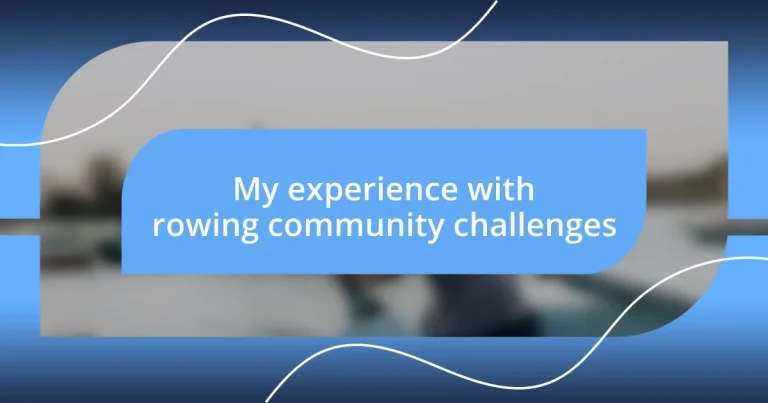Key takeaways:
- Challenges in rowing include accessibility for diverse backgrounds, team cohesion issues, and physical demands, requiring communication and perseverance.
- Building connections within the rowing community enhances camaraderie and support networks, transforming practices and events into memorable experiences.
- Participating in local competitions solidifies bonds among teammates and fosters resilience, as overcoming challenges together strengthens relationships and personal growth.

Understanding rowing community challenges
Being part of a rowing community can be incredibly fulfilling, yet it also comes with its own set of challenges. I remember the first time I joined a local rowing club; I was filled with excitement but quickly realized how daunting the dynamics between experienced and novice rowers could be. Have you ever felt out of place in a group? I certainly did, as I navigated the unspoken competition and learned to find my voice among seasoned athletes.
One of the most significant hurdles I encountered was the accessibility of rowing clubs for individuals from diverse backgrounds. It’s disheartening to see that some talented individuals may never experience this wonderful sport due to financial barriers or lack of exposure. I’ve often wondered how many future champions we miss out on simply because they don’t have the opportunity to try rowing. It’s this kind of reflection that drives conversations about inclusivity within our community.
Additionally, maintaining a cohesive team spirit can sometimes feel like rowing against the current. I’ve witnessed moments where personal conflicts and differing motivations created tension, affecting group performance. Have you sensed the shift in energy when team cohesion falters? I certainly have. Understanding these challenges reminds us that open communication, empathy, and shared goals can help steer our community back on course.

My personal rowing journey
Joining the rowing community was like stepping into a whole new world for me. Initially, my enthusiasm was met with a wave of nerves, especially when I contrasted my skills with those of the more seasoned members. I’ll never forget the first regatta where I watched my teammates glide through the water effortlessly while I struggled just to keep a steady rhythm. It was a humbling experience, and I felt a mix of admiration and intimidation.
- I learned the importance of persistence; with every practice, I felt my skills improve.
- Eventually, I forged friendships that supported and motivated me during my toughest days.
- A memorable moment was when I finally caught up to my team during a race, and we crossed the finish line together, a mix of exhaustion and exhilaration.
- I witnessed firsthand how celebrating small wins can build camaraderie and stronger bonds within the crew.
Reflecting on that period, I realize it pushed me to re-evaluate my approach towards challenges. Rowing taught me that vulnerability is strength; embracing it created space for authentic connections, making my journey not just about rowing faster but also about growing together.

Key challenges faced in rowing
Rowing presents unique challenges that can test both your mental and physical endurance. A significant obstacle for many, including myself, is the physical demand of the sport. I learned this the hard way during my first few practices when I underestimated the stamina required to keep up with my team. Each stroke felt like a battle, and I often found myself gasping for air while my more experienced teammates seemed unfazed. It was a wake-up call, pushing me to prioritize conditioning outside of our regular practices.
Another common challenge in rowing is the weather. I remember setting out on a chilly morning, only to be greeted by unexpected gusts of wind that made each row tougher. The shift in conditions taught me the importance of adaptability. I quickly learned that being mentally prepared for unpredictability was just as crucial as physical readiness.
Lastly, the time commitment is a frequent concern among newcomers. Balancing training with work or school can feel overwhelming. I’ve spoken to fellow rowers who expressed frustration about fitting in their personal lives with the rigorous practice schedules. Each person struggles with this at different points, but I often remind myself that devotion to the sport can yield lasting friendships and unforgettable experiences. The rewards, I believe, far outweigh the sacrifices.
| Challenge | Description |
|---|---|
| Physical Demands | Rowing requires significant stamina and strength, presenting a steep learning curve for novices. |
| Weather Conditions | Unpredictable weather can greatly affect practice, demanding both physical and mental resilience. |
| Time Commitment | Balancing the hours spent training with other life responsibilities can be challenging. |

Strategies to overcome challenges
When facing challenges in rowing, I found that setting clear, realistic goals was essential. During my early days, I would often overwhelm myself, aiming for instant mastery. I remember one day, after another grueling practice, I sat down to reflect. It hit me: breaking my goals into smaller, achievable steps not only made the process less daunting but also kept me motivated. Have you ever felt that sense of accomplishment just from ticking off a small goal? It’s incredibly rewarding, isn’t it?
Another strategy that proved invaluable was seeking support within my rowing community. I distinctly recall a particularly tough week when my stamina hit a wall. Instead of isolating myself, I reached out to a more experienced teammate for tips. The unexpected encouragement I received not only boosted my skills but also enriched my connection with others in the crew. Sharing challenges is powerful; it transforms individual struggles into collective growth. How often do we underestimate the strength of camaraderie in overcoming our obstacles?
Lastly, embracing a mindset of flexibility and resilience was a game changer for me. I still vividly remember a regatta day when the weather turned ominous, and our hearts sank at the thought of cancellation. Instead of frustration, we used the time to bond and focus on our techniques. It’s moments like these that taught me the importance of adaptability—not just in rowing but in life too. Cultivating a positive attitude in the face of uncertainty can truly change your perspective. Have you ever considered how a shift in mindset could transform your experience?

Building connections within the community
There’s something special about the connections formed within the rowing community. I remember my first group outing—it was an icebreaker, a chance for team members to share stories and laugh together. What struck me was how quickly barriers fell; we were no longer just rowers but friends with common passions. Engaging in shared experiences like these not only fostered camaraderie but also made the brutal practices more enjoyable, turning them into opportunities for deeper connections.
In another instance, I participated in a fundraising event organized by our club. It was more than just a charity; it felt like we were all working together for a common cause. That shared experience brought our crew closer than ever. Standing shoulder to shoulder, counting every stroke and every dollar raised, I felt a profound sense of unity. Have you ever taken part in a community effort that transformed your relationships? It truly has a way of strengthening ties that might not have formed otherwise.
These connections extend beyond training and competitions. I often find myself chatting with teammates about life outside the boat—jobs, dreams, struggles. Opening up like this helped me realize the importance of support networks. When I faced personal challenges, it was a fellow rower who reached out with advice and encouragement. Having someone who understands your dedication to the sport makes all the difference. I challenge you to think about how many supportive voices you have in your own life. Are you nurturing those connections?

Participating in local rowing events
Participating in local rowing events has been a transformative experience for me. I still remember my first regatta: I was a bundle of nerves, gripping my oar tightly, surrounded by the buzzing energy of teammates and competitors alike. As we lined up at the starting line, I realized that the adrenaline coursing through my veins wasn’t just fear—it was excitement. Have you ever felt that incredible blend of anticipation and determination before a big moment? It’s truly unforgettable.
One particular event stands out in my memory. During a local competition, our team faced unexpected challenges. A storm rolled in, threatening to postpone everything, but instead of retreating, we rallied together, practicing our strokes under the gray skies. That day, something clicked among us; we became a collective force determined to push through. It reminded me again of the resilience that rowing cultivates. Have you thought about how overcoming challenges in a group can strengthen your bonds?
Competing not only sharpened my skills but also introduced me to a vibrant network of fellow rowers. After one event, I found myself at an after-party, surrounded by people I had only just met but felt a deep connection with. We swapped stories of triumphs and defeats, forging friendships that extended beyond the water. There’s an unparalleled joy in celebrating victories together, don’t you think? Those moments—laughter, camaraderie, and shared passions—are what truly make local rowing events special, transforming them into something much more than just races.














